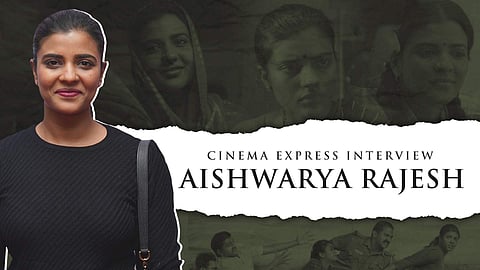

Aishwarya Rajesh’s filmography is a unique bag of stories. There’s National Film Award-winning Kaaka Muttai in which she played a nameless mother of two; there is Ka Pae Ranasingam, single-handedly shouldered by her. And then, there are those star-studded films like Chekka Chivantha Vaanam and Saamy Square. “I want to balance my film choices. It has to be a mix of all kinds of films, and I don’t want to stick to just one genre,” says Aishwarya, last seen in the rather fun Soppana Sundari, and awaiting the release of the much more serious, Farhana. Polar opposites in film choices have been a hallmark of Aishwarya's career, but she has no one method that she applies when choosing films. “I am not sure. It is all about the narration. When I hear stories, sometimes, there are moments that determine whether I like them or not. I ask myself whether I’m excited about them.”
So, what excited her about her upcoming release, Farhana? “The film is about a simple Muslim girl’s life. Even now, we have people who are confined within kitchen walls, their talents going to waste. Farhana is about a woman who works at a call centre and breaks the shackles. It is a story that is relatable to everyone, but we have adopted a different approach in making it.”
While the actor dabbles between doing such socially conscious films (Kanaa, Ka Pae Ranasingam, The Great Indian Kitchen) and genre films like Bhoomika, Aishwarya believes that all her films have a common universal appeal. According to her, they also attempt to create impactful conversations. “There will be a small message in every film I do beyond its entertainment value. Social responsibility will always be an important aspect of my films.”
In Soppana Sundari, a comic caper, three women (Aishwarya, Lakshmipriya Chandramouli, and Deepa Shankar), are at the helm of performing comedy. While the Tamil industry has seen comedians like Manorama and Kovai Sarala, and rare occasions in which lead women do some comedy, women have largely been pushed to the periphery when it comes to humour. “The lives of women, in fact, buzz with so much humour and fun. In Soppana Sundari, we did not write comedy for its sake. We drew it from the reality of the situations those characters are in.”
Be it trying comedy in Soppana Sundari; or playing a cabbie in Driver Jamuna and breaking the notion that women are bad drivers or playing a mother in Kaaka Muttai, Aishwarya has broken many stereotypes as an actor. “It is important to me as an actor, yes, but even more importantly, as a woman, I want to eradicate the notion that only men can do certain characters. In today’s world, women are taking the reins everywhere.”
Aishwarya believes that it is important for women characters to have layers instead of being cardboard cut-outs. “It is important for the evolution of an actor because such layers—like playing a minority religion character in Farhana—help extract more complexity in the performances. When you do similar roles, people get jaded as well.” At the same time, the actor also trusts her filmmakers to come up with such roles. “Filmmakers travel a lot more with their scripts than actors do. In the case of Farhana, Nelson (Venkatesan) knew her for four years and my job was only to elevate the character based on his inputs.”
Having done a variety of roles so far, Aishwarya ends this conversation by hoping that she can play a warrior princess sometime. “It could be fantasy, historic or fictional. It could be a Wonder Woman or an Amman film. I would also like to do a proper negative role, along the lines of Neelambari.”